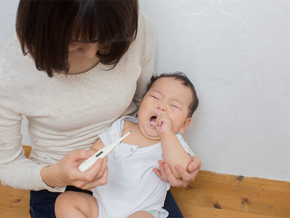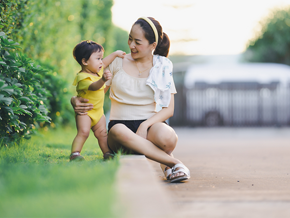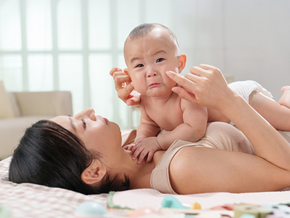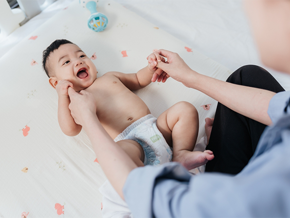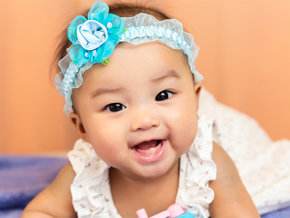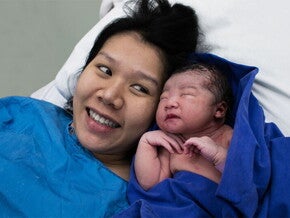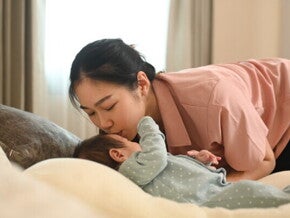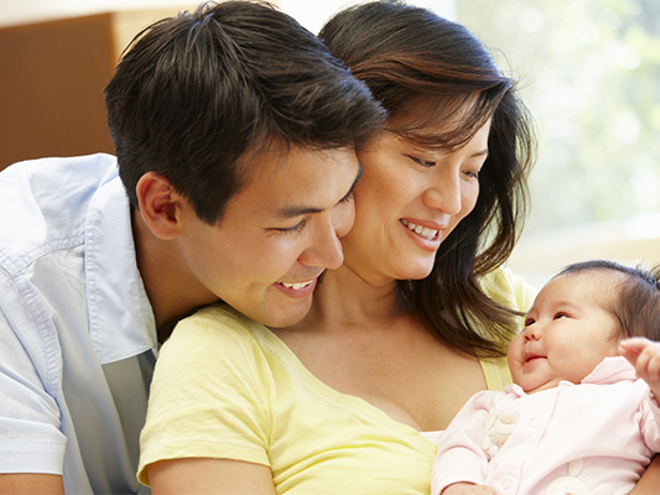
Your little one changes so fast. One day, they're a sleepy newborn, the next a cooing baby sitting up and discovering their world. From first smiles to first sentences, here are the key child development stages to look forward to.
Why Milestones Matter
Before exploring each stage, it's helpful to know why these developmental milestones are important. Understanding the stages of development empowers you to support your child's growth, spot potential delays early, and strengthen your bond.
The milestones in this guide are based on the updated checklists from the Centers for Disease Control and Prevention (CDC) and the American Academy of Pediatrics (AAP).
These milestones cover different areas of growth:
- Social and emotional
- Language and communication
- Thinking and learning (cognitive)
- Movement and physical development
However, remember that every child follows their own unique path. If you’ve got questions about their progress, consult your pediatrician.
Stage 1: The Newborn (0 to 3 Months)
The early infancy stage is all about adjusting to the world and building a connection with you. Your baby learns through their senses, focusing on bonding, feeding, and slowly gaining control over their movements.
Here are some of your baby's first milestones at 2 months old:
- Smiles when you talk or smile at them
- Calms down when you speak to or pick them up
- Makes cooing sounds
- Turns their head toward sounds
- Pays attention to faces
- Watches you as you move
- Holds their head up during tummy time
- Make smoother movements with their arms and legs
Stage 2: Infancy (3 to 12 Months)
This stage is full of firsts—your baby is gaining motor skills and their personality is starting to shine. They’re becoming an active and curious explorer, ready to engage with the world.
By 4 months
- Chuckles when you try to make them laugh
- Smiles on their own to get your attention
- Makes cooing sounds like “oooo” and “aahh”
- Turns their head toward the sound of your voice
- Looks at their own hands with interest
- Opens their mouth when they see a breast or a bottle if they're hungry
- Holds their head steady without your support
- Pushes up onto their elbows or forearms during tummy time
By 6 months
- Laughs
- Knows familiar peoples
- Takes turns making sounds with you
- Blows “raspberries” by sticking their tongue out
- Reaches to grab a toy they want
- Puts things in their mouth to explore
- Rolls from their tummy to their back
- Leans on their hands for support while sitting
By 9 months
- Shows different facial expressions (happy, sad, angry)
- Plays games with you, like peek-a-boo
- Makes sounds like “mamamama” and “babababa”
- Lifts their arms to be picked up
- Looks for objects they’ve dropped out of sight
- Bangs two things together
- Gets into a sitting position by themself
- Pulls up to a stand
By 12 months
- Plays games with you, like pat-a-cake
- Waves “bye-bye”
- Calls a parent “mama” or “dada”
- Understands “no” (by pausing or stopping briefly)
- Puts things into a container, like a block in a cup
- Looks for things they see you hide
- Walks while holding onto furniture (cruising)
- Picks things up between their thumb and pointer finger
For a closer look at the big checkpoints in this stage, you can explore our detailed guides on the 6-month and 12-month developmental milestones.
Stage 3: The Toddler (1 to 3 Years)
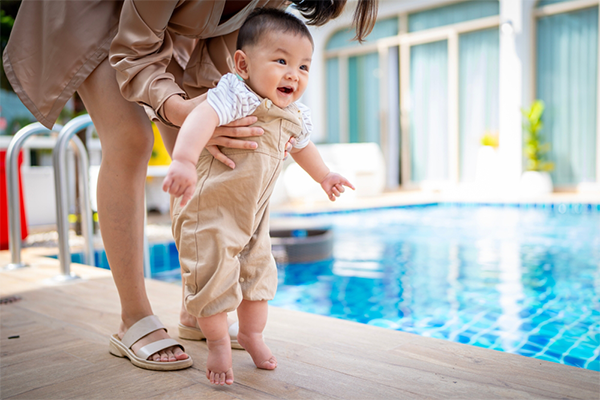
The toddler stage is all about exploration. Providing a safe space allows your child to build confidence and motor skills.
Welcome to the toddler stage! At this point, your child is learning to walk, talk, and express their own thoughts and ideas. Here’s what you might notice as your toddler grows more independent.
By 15 months
- Shows you affection with hugs, cuddles, or kisses
- Copies other children while playing
- Tries to say one or two words besides “mama” or “dada”
- Points to ask for something or to get help
- Stacks at least two small objects, like blocks
- Tries to use things the right way, like a cup or a phone
- Takes a few steps on their own
- Uses their fingers to feed themself
By 18 months
- Points to show you something interesting
- Helps you dress them
- Tries to say three or more words besides “mama” or “dada”
- Follows one-step directions without any gestures
- Copies you doing simple chores
- Plays with toys in a simple way, like pushing a toy car
- Walks without holding onto anyone
- Tries to use a spoon
By 24 months
- Notices when others are hurt or upset
- Looks at your face to see how to react in new situations
- Says at least two words together, like “More milk”
- Points to things in a book when you ask, "Where is the...?"
- Tries to use switches, knobs, or buttons on a toy
- Holds something in one hand while using the other
- Runs
- Eats with a spoon
By 30 months
- Plays next to other children and sometimes with them
- Follows simple routines, like cleaning up toys
- Says about 50 words
- Says words like “I,” “me,” or “we”
- Uses objects for pretend play
- Follows two-step instructions
- Jumps off the ground with both feet
- Takes some clothes off by themself
Stage 4: The Preschooler (3 to 5 Years)
The preschool years are all about learning through play and making new friends. You'll see your child start to communicate in new ways and better understand the world around them.
By 3 years
- Notices other children and join them to play
- Calms down within 10 minutes after you leave them
- Has a conversation with at least two back-and-forth exchanges
- Asks “who,” “what,” “where,” or “why” questions
- Draws a circle when you show them how
- Avoids touching hot objects when you warn them
- Puts on some clothes by themself
- Uses a fork
By 4 years
- Pretends to be someone else during play (like a superhero)
- Comforts others who are hurt or sad
- Says sentences with four or more words
- Talks about at least one thing that happened during their day
- Names a few colors
- Draws a person with three or more body parts
- Catches a large ball most of the time
- Serves themselves food or pours water (with supervision)
By 5 years
- Follows rules or take turns when playing games
- Does simple chores at home
- Tells a story they have heard or made up
- Keeps a conversation going with three or more exchanges
- Counts to 10
- Writes some letters in their name
- Hops on one foot
- Buttons some buttons
Supporting Your Child’s Development
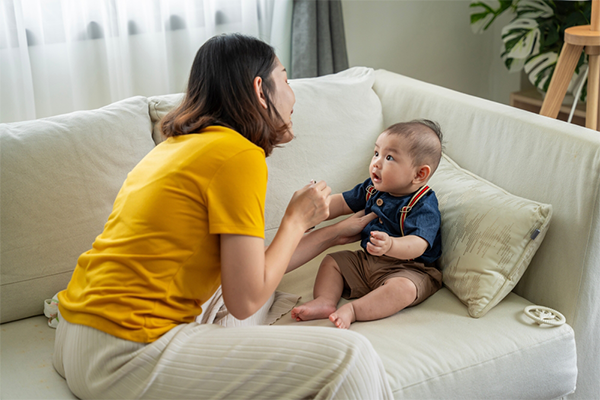
Your warm and responsive support makes all the difference during the key child development stages.
Watching your child grow is exciting. As you follow these developmental milestones, keep these points in mind.
Pay attention to your child’s pace
Milestones are guides, not strict rules. The CDC bases them on what most children (75% or more) can do by a certain age, which is why it's common for kids to be a little ahead in some areas and a little behind in others.
Use check-ups to track development
Regular check-ups are the best way to monitor your child’s overall growth. In fact, the AAP advises doctors to monitor your child's development with a well-child visit—a simple check-in where they observe your child and ask you questions to make sure they're progressing well. This is the ideal time to consult with your pediatrician if you’ve noticed any developmental delays.
Provide warm and responsive support
Engaging in activities such as talking, reading, or playing with your child has a significant impact on their development. A 2021 global meta-analysis in PLoS Medicine found that tuning in to and responding to your child's cues with warmth is one of the most effective ways to support their brain development and social skills.
All of your loving support is what makes watching your child's journey so rewarding. As they move through the child development stages, remember to enjoy every new smile, step, and story you get to share.
Share your own milestone moments! Connect with a community of parents in the ParentTeam Moms and Dads Facebook group to talk all about the child development stages.
References
American Academy of Pediatrics. "Early Relational Health." n.d. Accessed October 2, 2025. https://www.aap.org/en/patient-care/early-childhood/milestone-timeline/
Centers for Disease Control and Prevention. "CDC's Developmental Milestones." Last modified June 11, 2025. Accessed October 2, 2025. https://www.cdc.gov/act-early/milestones/index.html
Centers for Disease Control and Prevention. "Developmental Monitoring and Screening." Last modified February 26, 2025. Accessed October 2, 2025. https://www.cdc.gov/act-early/about/developmental-monitoring-and-screening.html
Centers for Disease Control and Prevention. "Tips for Talking with Parents about Developmental Concerns." n.d. Accessed October 2, 2025. https://www.cdc.gov/ncbddd/actearly/pdf/parents_pdfs/tipstalkingparents.pdf
Cleveland Clinic. "Child Development." n.d. Accessed October 2, 2025. https://my.clevelandclinic.org/health/articles/21559-child-development












